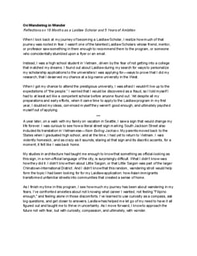Taking a Step Back - LiA Reflection Week #3
Fairplay For All Foundation is a non-profit community organization based in Payatas, a large urban poor community in Metro Manila, Philippines. The organization takes a holistic approach to empowering its community to break cycles of poverty and trauma. My work with Fairplay is focused on two projects: (1) Writing an internal report on how Fairplay can better support families in Payatas in accessing quality employment opportunities. (2) Helping facilitate 'Emotional Quotient (EQ)' sessions that support the emotional and mental well-being of local children.
My third week at Fairplay was a difficult one. Having spent most of my first two weeks working out of the Youth Center, this week took me outside, walking through different parts of Payatas for various tasks. The experience was heavy. I witnessed inadequate sanitation, cramped homes, and malnourishment. These realities stayed with me for the questions they raised about how I should approach this work.
As I reflect, I am wary of slipping into “poverty tourism,” a way of seeing urban poor communities only through the lens of struggle. That perspective, even if unintentional, strips people of their dignity. The hardships I observed are urgent and real, but they are only part of the story. Reducing Payatas to struggle alone would overlook the resilience, creativity, and joy that animate daily life in the district.
This tension became clear as I compared my experiences around the district with moments at the Youth Center. There, children’s laughter filled the classroom with joy and energy. These moments did not erase the challenges outside, but they reminded me that poverty cannot be captured solely by statistics or images of suffering. Joy and struggle coexist, and holding both together requires challenging my assumptions about what the experience of poverty is actually like.
Ultimately, this week taught me the value of stepping back. To truly understand, I need to approach this work with intention: not to simplify, not to sensationalize, but to see people in their full humanity. That means recognizing the structural barriers that sustain poverty while also centering compassion, dignity, and everyday life. It is a lesson I carried with me as I continued my time at Fairplay.
What went well?
This week I assisted a researcher conducting interviews in the district. Her questions were wide-ranging, including a section on the struggles of accessing quality employment, which provided insights for my own report. Having spent much of the past two weeks facilitating EQ sessions, it was rewarding to make progress on the report.
Alongside the EQ sessions, the Youth Center also conducts tutorial sessions where staff support students in completing math and English worksheets. The math sessions were a great opportunity to practice my Tagalog. One student, perhaps endearingly, commented on how much I had improved. It was a small comment, but I still remember it almost four months later because of how fulfilling it felt to work with the district’s children.
What could have been done differently?
This was an emotionally difficult week as I tried to process my experiences and emotions. I now realize the importance of taking a step back after a challenging moment. One technique Fairplay encourages for both students and staff is a five-minute meditation. I am learning the benefits of incorporating this practice whenever I notice that I am not in the right headspace.
What did I learn about myself when working with others? What did I learn about leadership?
During my time at the Youth Center, I developed a stronger understanding of what it means to work alongside a team. While I have worked in many teams before, I often took roles either delegating tasks as the team lead or completing assigned tasks as a team member. Here, I am experiencing what it is like to work on tasks that cannot be done by any one person.
The practice of co-creating and co-facilitating, where agency and responsibility are shared, is a team dynamic I only began to experience this academic year and even more so at Fairplay. Reflecting on my time co-creating EQ sessions with Fairplay’s staff and leaning on the perspective of the researcher for my internal report, I realize that the co-creation model of leadership fosters shared ownership, leverages diverse perspectives, and encourages collective problem-solving. It strengthens trust, builds team capability, and often produces more innovative and adaptable outcomes, as everyone contributes not just effort but ideas and expertise.
What do I want to develop or focus on next?
This week of stepping back, reflecting on my emotions, and encountering the indignifying aspects of poverty has shown me how much more work I need to do in letting go of the facade of control. I have long championed collaboration and inclusion in my work. However, reflecting on my experiences this week, I realize the work I still have to do in actually putting these principles into practice.

Please sign in
If you are a registered user on Laidlaw Scholars Network, please sign in